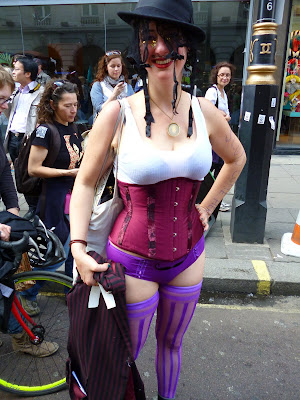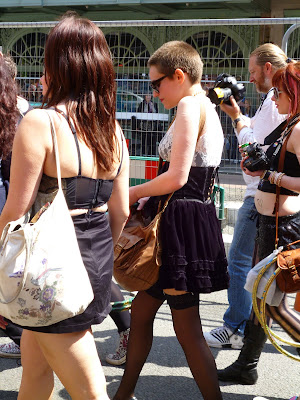Thursday, 16 June 2011
Paradise?
While living and working with Sinhalese and Tamil Sri Lankans in the East of Sri Lanka for 3 months, I learnt a lot about the devastation caused by the civil war - death, displacement, injury, shelling, destruction of buildings, economic stagnation, corruption, rape...the list goes on. I even experienced being stopped at police checkpoints, which, although there are fewer now, are still in place between districts, and where Tamils may still be stopped and interrogated about where they are going and why.
However, the majority of what I heard about the civil war which raged in the North and East of the country for over 30 years was unreal for me; stories which touched me and made me cry, but which were still almost fiction to me, having no personal experience of it.
I once sat and listened to a Tamil woman talk about how she and her family had to escape from attacks by both government forces and the LTTE (Tamil Tigers), wading through rivers in the pitch black and hiding in forests. Tears ran down her face when she described how she had to lie ontop of her 3 year-old son so that he wouldn't be shot in the head. The fear a mother must feel at that moment of utter powerlessness, trying to keep her children safe, but not knowing how or for how long. Although her family survived and relocated after their displacement, many thousands did not, as Channel 4's harrowing 'Sri Lanka's Killing Fields' documentary shows.
The real-life footage of atrocities committed by both sides held me speechless in disgust. One woman tells how the Red Cross came to provide both sides with the GPS co-ordinates of local hospitals, so they wouldn't hit them, but the government forces used this information to target 65 hospitals directly. A beautiful TV presenter on the LTTE channel is reading news in a saree one minute, and lying naked and dead the next, having been brutalized, raped and killed by government troops. Somehow, previously seeing her in such a public role makes her horrific fate so much more real and representative of the hundreds of other women sexually assaulted, then tossed aside for being Tamil.
The distance between the decision-makers at the top, like President Rajapaksa, and the victims of the fallout of their decisions is so great it is sickening. While he sends his children to international private schools and buys cars and bodyguards for his wife in Colombo, poor, vulnerable people were losing their lives on the opposite side of his small island. His corruption is so entrenched now, as he has appointed family members into the most senior positions of government, that the country seems to be moving towards a dictatorship.
The video raises the question of how much the UN can do to intervene in crimes against humanity. When the UN workers in the North of Sri Lanka were told to leave by the government, they had to, and could do nothing to prevent the killings being carried out. However, I do believe the 'international community' must expose and denounce such atrocities, and show that we do care about people being killed on the other side of the world.
I will certainly be lobbying my MP to let him know that I care about people like the Sri Lankan volunteers I lived and worked with for 6 months, and that something must be done to defend the rights of the Tamil minority, and the Sinhalese civilians affected by the violence, which have been violated for so long.
Wednesday, 15 June 2011
Tuesday, 14 June 2011
Poor Kids

"I don't want to grow up" said 8-year-old Courtney as she lay on her hole-ridden bed, scratching her eczema-scarred ankle. Because for her and 3.5 million other children in the UK living in poverty, growing up only means the stress of struggling to feed a family on less that £70 a week and getting into debt. Courtney's mum can't even afford a bus fare, a sobering fact that has resigned Courtney to believe that she will “always be poor”, unlike her friend whose parents both have jobs and can afford holidays to Greece.
In another scene, Sam, an eloquent 11-year-old, reveals many of the compounding effects of being poor. He is bullied at school for wearing his sister’s second-hand uniform and called “mop-head” because his dad can’t afford to take him to a barber’s. He eventually does get his hair cut for £9 as a 12th birthday present, as well as a card. He knows the value of money; for him £1 means 6 hours of TV, paid on a meter. He doesn't want to have a wife, because "she might leave me", as his mum did on his second birthday.
Paige, who lives with her parents in a high-rise flat in Glasgow, points out the damaging effect of damp on the health of children living below the poverty line as she covers her mouth in disgust, looking up at the blackened ceiling of her friend’s bathroom.
It seems unbelievable that so many children and their families must live in such unsuitable accommodation while thousands of houses lie boarded up and empty across Britain, which should surely be renovated and given to families in need.
The responsibility for increasing the opportunities of poorer children lies with many people; local authorities, parents, schools and the government all have their role to play. Admittedly, the provision of free swimming, free family planning clinics, and free bus rides in deprived areas has increased, and libraries have always been places to access books and computers for free.
However, these services are rendered redundant if parents do not know how to access them, or schools do not take advantage of publicizing them.
And as for the government…well, the protests against the cuts only touched the surface of their irresponsibility. When in East Lancashire recently, I attended a community debate in a community centre that was going to be shut down owing to the cuts. The children there were extremely vocal about the damaging effect the closure would have. Not only would it would remove a place they could relax and play in, but they also believed it would reinforce stereotypes of hooded, criminal-minded teenagers hanging out on street corners, and thereby increase tensions and mistrust within the community, further impeding people's abilities to work together tho improve their community.
Poverty is not just lacking money. It pervades and cripples so many other areas of life; health, education, social inclusion, and in particular one's sense of one’s own prospects and future.
Organizations like Kid's Company are doing great work to tackle the traumatic effects of poverty and support children to grow into independent, secure adults. But we should also think about how we can do our bit, whether through lobbying MPs, supporting charities, setting up free after-school clubs at the local library or contacting schools to inform them about free facilities in the area.
It's documentaries like this that really make me want to get onto Teach First...fingers crossed.
Monday, 13 June 2011
"Just cos you can see my butt, doesn't mean that i'm a slut..."

SLUTWALK London 2011 was an amazing experience. The 3,000 participants approached the serious message behind the anti-rape march - 'Whatever we wear, wherever we go, yes means Yes and No means No' - with a sense of fun and freedom.
There were female dogs *ahem* in corsets, men in short skirt and fishnet combos and even a bare boob (or two). Banners emblazoned with "Consent is sexy", "My little black dress isn't an invitation", and even one re-interpreting the name of the event as "Vulva Trot" floated above the crowd alongside red heart-shaped balloons.
The sound of impassioned chanting filled the street of Piccadilly, with "Hey hey mister, get your hands off my sister!" and "Just cos you can see my butt, does mean that I'm a slut" firm sing-along favourites.
At the base of the aptly phallic-shaped Nelson's column, the slutwalkers assembled to hear inspirational speeches from the 17-year old organizer, representatives from anti-rape groups, the transgender community and English Prostitute's Collective.
What struck me was that rape isn't caused by superficial sexual attraction. Women dressed in full burkhas are raped, as are elderly women. Rape is also most commonly perpetrated by lovers, husbands or friends who, let's be honest, have probably already seen their victim naked.
So the reason must lie in an abuse of power or dominance, which undermines the assertion that if you go out wearing a short skirt, then the likelihood of you being raped becomes astronomical. This stereotype only serves to inhibit women's confidence and freedom to dress how they like, and unfairly assumes that men are all secretly rapists who can't control themselves when they see a bit of upper thigh.
The fact that many women don't report rape because they know they amount of cross-examination they will have to undergo in court about their personal life, sexual past, how much they were drinking and how short their skirt was that night is patronizing and demeaning, and places undue guilt upon the victim.
As the organizer of the march said: "SLUT means SPEAK UP".
This is something women and men need to do in order to undo the damaging stereotype that is silencing our right to security and freedom from violence.
Subscribe to:
Comments (Atom)





